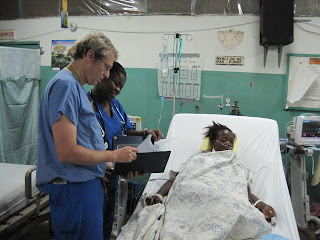


It's 3 am and I am sitting on one of the benches outside the main entrance of
Hospital Sacre Coeur. It is actually cool tonight, the skies have cleared
and I can see the stars through the palms. The animals are active. Apparently we have monkeys in the trees just up the hill.
I'm not having trouble sleeping; I'm working tonight as the ICU charge nurse.
Last week, I wrote to you about the transitions that occur on weekends. Our ICU nurses are all leaving early tomorrow. Since I have a bit of flexibility, I assigned myself to work with the Haitian nurses. I learned that with some patience, a calculator, and a volunteer interpreter, you can get a lot done.
Traditionally, wards may not have nursing at night, and if they do, the nurses
there expect to sleep. Medications that are dosed at night often aren't given.
We tried to explain to the Haitians why it was important to give meds on time, they agreed, but it still didn't happen. Tonight I learned that if a patient is prescribed a drug, it is up to the family to buy it and to bring it to the hospital. Often the family will do the dosing, and if they can't afford of full prescription, they will only bring enough for one dose a day.
Its a bit different in the ICU, since many of the meds are donated and are given
IV. Dalie is Mr M's nurse tonight. He is due for 3.375 gm of Zosyn, an antibiotic. Our donated vials contain 4.5 grams of powder. We sat down together and did the calculations. First we dissolved the powder in a set amount of saline. We determined how many ccs would contain the right amount of drug. We wanted to give it in 100 cc of fluid total, and withdrew the dose volume from the bag,then added the Zosyn She labeled it with cloth tape, a marker, and her initials. I helped her hang it and sign off the chart. She smiled.
As part of the transition for the next teams, I prepared a large sign with each
patient's diagnosis, operations, and care plan. (HIPPA is not an issue.) The families asked me to explain what the sign said. Through an interpreter, I was
able to sit with each patient, and take the time to discuss what had happened as well as future plans. They must have been reassured because now,as I step
outside, most of the patients and their families are asleep.
One of the most rewarding parts of this experience has been the chance to get
back to the core of health care - the patient. And by all of us blurring traditional practice boundaries, we are gaining new insights into ourselves and a greater appreciation of the interdependence of those around us.

No comments:
Post a Comment